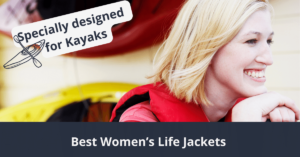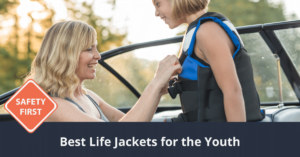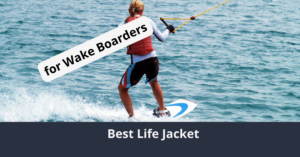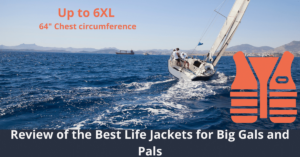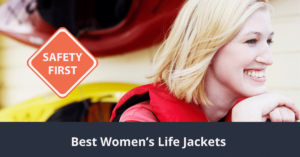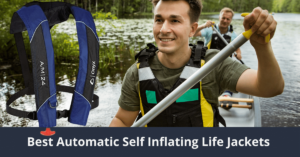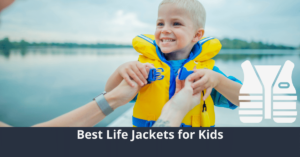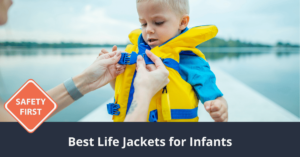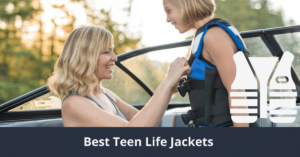Spending time on the water is fun for the whole family, but only if you follow safety guidelines. The best life jackets for toddlers help them stay out of harm’s way and give you peace of mind whether you’re at the pool, on a boat, or splashing in the ocean.
In this article, we’ve provided toddler life jacket reviews to help you make your selection a little easier. We’ve also included a buyer’s guide so that you know what to look for in a toddler life vest or puddle jumper.
You’ll also find out what styles are ideal for children, ages 1 to 3, that weigh between 15 and 30 pounds. Learn whether you need a specific type of life vest for boating vs. swimming as well as some handy safety tips for using a toddler life jacket.
(If you need to purchase life vest for boating, please visit: Boating Life Vests)
Everything you will learn here
- The Best Life Jackets for Toddlers (Updated 2023)
- 1. Stohlquist Toddler Life Jacket Coast Guard Approved Life Vest for Infants
- 2. Stearns Infant Puddle Jumper Hydroprene Fish Print Life Jacket
- 3. Onyx General Purpose Boating Vest
- 4. O’Neill Wake Waterski Infant USCG Vest
- 5. Gogokids Kids Swim Vest Float Swimsuit
- 6. Airhead Treasure Life Vest
- 7. Elejolie Swim Aids for Toddlers
- 8. Connelly Babysafe Nylon Vest
- 9. Salus Bijoux Baby Vest
- 10. Jet Pilot Infant U.S Coast Guard Approved PFD Life Vest
- Life Jackets for Toddlers Buyers Guide – Making the Best Purchase
- Best Life Jackets for Toddlers Comparison Chart
- Wrap Up
The Best Life Jackets for Toddlers (Updated 2023)
Life jackets are sometimes called personal flotation devices, or PFDs. Details about the best life jackets for toddlers are below. We’ve included these reviews in no particular order, providing the pros and cons of each product.
1. Stohlquist Toddler Life Jacket Coast Guard Approved Life Vest for Infants
- FEEL COMFORTABLE IN THE WATER - Made of soft foam for maximum comfort, this child personal floatation device comes with a convenient grab collar for easy retrieval. The head support collar offers the security for them to play and be happy in the water
- BUCKLE UP - The single quick release front buckle provides added security and even has an adjustable crotch strap to fit any size. You'll notice the durability of this infant life vest from the box stitched buckle attachment that'll have you using this for years to come
- FEEL THE MOVEMENT - Life vests can be iritating for children. That's why we've made sure to design this infant PFD with full arm mobility so you can enjoy watching them play and swim
This is a USCG-approved type II PFD that accommodates children that weigh 8 to 30 pounds. It’s ideal for petite toddlers because it’s less bulky than many other type II PFDs. This type of life vest is designed to turn most children face-up in the water.
However, it doesn’t flip every child over. Make sure that you know how it works for your toddler before you use it.
The life vest has a zip-up front, which makes it easy to slip on and off. An easy-release buckle further secures the front of the PFD. The crotch strap is adjustable, which means that you can ensure that the life vest will stay down without riding up.
The grab handle on the back of the neck is well-placed and secure. You can use it to quickly access your child in the water or hang the PFD up to dry.
Pros:
- Streamlined profile allows for movement
- V-neck design doesn’t rub against child’s neck
- Lots of adjustable straps
- Adjustable crotch strap
Cons:
- Doesn’t flip every child face-up
- Zipper could rub on child’s delicate skin
- Not ideal for teaching kids how to swim because it keeps them on their back
(If you want to review all best life vests for infants, please view: Infants Life Vests)
Is your child younger or older and the life jackets here are too big or too small? We have listed other sizes here:
2. Stearns Infant Puddle Jumper Hydroprene Fish Print Life Jacket
- US Coast Guard-approved infant life jacket
- Oversized head support encourages face-up flotation
- Made with a soft Hydroprene shell and durable Crosstech flotation foam
This life jacket fits like a padded suit that conforms to your child’s body. It has padding on the front of the abdomen and two adjustable leg straps that prevent the PFD from riding up.
One pad at the back of the neck acts as a support and promotes face-up flotation. The neck pad also has a grab handle to pull your little one out of the water.
Children can’t easily access the fasteners while using this life vest. The flotation device has a side buckle and back zipper to make it easy for the child to get in and out while staying safe in the water.
Pros:
- Encourages face-up flotation
- Lightweight foam is comfortable to wear all-day
- Durable grab strap
- Two crotch straps won’t ride up your child’s bottom
- Fun colors help your child stand out
Cons:
- Neck opening might be tight on a chubby baby
- May not flip all children onto their backs
- The torso is not adjustable
3. Onyx General Purpose Boating Vest
- Durable nylon oxford outer shell
- Adjustable belts and chest strap
- Lightweight and durable flotation foam
This boating vest comes in a variety of sizes for everyone in the family. The infant/child size fits children up to 50 pounds so it would be ideal for a toddler.
This is a type II flotation device. It should flip most children to float on their backs. The PFD also has open sides and adjustable straps to allow for expansion through the torso.
Although this life vest might be bulkier than some others, the foam and outer material are soft. The padding should conform to the body, allowing for improved mobility.
Pros:
- Open sides allow for torso expansion
- Wide size range accommodates most toddlers
- Crotch strap prevents it from riding up
- Grab strap is sturdy
- Neck support helps keep head above water
Cons:
- Might feel snug and uncomfortable on some kids
- Small neck opening
- The size might run a little small
4. O’Neill Wake Waterski Infant USCG Vest
If you spend a lot of time boating or doing water activities that involve waves, this type II flotation device might be appropriate for your toddler. This life vest is secure and buoyant. It probably works better for keeping your child safe on a boat than for splashing around in the pool.
Like all type II life vests, this one encourages children to flip onto their backs when they’re in the water. Because most of the buoyancy is in the front of the body, it would make it difficult for a child to swim facing downward.
The grab loop is narrower than some others. However, it’s longer and should be easy to take hold of.
This USCG-approved life vest is more durable than many on the market. It should stand up to heavy use.
Pros:
- Quick zipper entry and exit
- Nylon shell is soft and comfortable
- Ultraviolet protection adds to durability
- V-neck is roomy and comfortable
- Adjustable crotch strap
Cons:
- Not ideal for learning how to swim
- BulkyGrab loop is narrower than some others
- Might be large on some children
5. Gogokids Kids Swim Vest Float Swimsuit
When we updated the article, we noticed, that this product is currently not available.
This is a swim vest that’s designed to improve buoyancy in the water. It can help kids float while they’re learning to swim and make them more confident around water. However, it’s not a life-saving device.
The swim vest comes in three sizes. The small is best for toddlers that weigh less than 30 pounds. This swim vest may not prevent a child from drowning. But it can help kids understand how it feels to float in the water while swimming.
The swim vest doesn’t flip the child onto their back when they’re submerged in the water. This makes it excellent for helping kids learn to swim, though.
The buoyancy device has a whistle attached to the zipper in front. Children that need help in the water can blow on the whistle to attract attention.
But some customers say that their toddlers end up pulling the zipper down when they’re playing with the whistle. The zipper doesn’t lock in place, and it can slide down during use.
Pros:
- Streamlined and comfortable
- Keeps arms free for swimming
- Easy zippered opening
- Soft bindings prevent chafing
- Neoprene material is soft and warm
Cons:
- Not USCG-approved
- May be too large for infants
- Zipper doesn’t lock in place
6. Airhead Treasure Life Vest
- SAFE and SECURE – US Coast Guard Approved closed sided Life Jacket for a comfortable yet secure fit
- COMFORT and FUN – Ocean inspired graphics add bright color fun in this USCG Approved Life Vest
- FIT and DURABILITY – Front Zipper with adjustable waist belt and crotch strap provide extra safety and peace of mind the life jacket will keep your child safe on the water. Soft UV and Stain resistant 200-Denier Polyester is rugged enough for all your water adventures
This type II life vest should help kids roll to their backs while they’re floating. It features a front zipper, so it’s easy to put on and take off of your little one. The adjustable waist belt allows for additional adjustments and keeps the vest on even if the zipper goes down.
The fabric on the outside of the vest is soft and stain-resistant. Its UV protection also prevents it from breaking down in the sunlight.
The grab handle makes it easy to help your child in the water. The headrest is an additional safety feature.
This life vest provides plenty of buoyancy but remains lightweight. It’s comfortable for little ones to wear and shouldn’t impede their movement.
Pros:
- Cute designs might encourage kids to wear it
- USCG-approved
- UV-resistant fabric
- Lightweight and allows child to move freely
Cons:
- Narrow grab handle
- Crotch strap is especially long
- Not all kids might want to wear the design
7. Elejolie Swim Aids for Toddlers
- :Application:Baby swim training included net bag,Kids arm wing for water park,Children Swim outdoorTraining for building swim confidence in water
- For Toddler:This swim life jacket suitable for 2-6 years old unisex child,could support the 22-66lbs weight for baby use.
- Varieties of Pattern :Toddler swim vest printed varities cute cartoon pattern on the surface,multiple choices for your unisex kids.
Many puddle jumpers with wings fit children that weigh 30 to 50 pounds. It’s not always easy to find this style of life vest for a smaller toddler. The Elejolie version fits kids that weigh 22 to 66 pounds. It’s ideal for children ages 2 to 7.
One band of foam goes around the child’s chest to hold them upright in the water. The foam on the arms provides additional buoyancy while your toddler is swimming or splashing around. Because this swim aid doesn’t flip kids onto their backs, it’s excellent for teaching them how to doggy paddle.
This company has listened to customer feedback and improved the fit of the arm sleeve for added comfort. This is one of the most comfortable puddle jumpers for toddlers.
The safety features also make this swim aid worthwhile. The buckle has added security to ensure that kids can’t take it off while they’re wearing it. The buckle also adjusts to ensure a perfect fit.
Pros:
- Fits smaller children than most puddle jumpers do
- Secure buckle closure
- Adjustable
- Comes with a bag for easy transport
- Great for kids who can move around in the water
Cons:
- Buckle can be difficult to open
- No grab handle
- Not USCG-approved
8. Connelly Babysafe Nylon Vest
- Under 30 lbs
- 2 adjustable straps w/ quick release buckles
- Soft baby hammock, lightweight and extremely breathable, great for hot days, keeps baby cool and comfortable
This USCG-approved life vest fits children up to 30 pounds and may be ideal for toddlers who are crawling but not yet walking. The PFD has a unique shape. It’s designed to support the head and neck while tapering down toward the hips and legs.
The life vest has a non-adjustable strap between the legs to keep it in place. Some consumers might wish the strap were tighter, though. It’s made of elastic, and it can’t be tightened for smaller children.
This PFD, however, is easy to put on. It has an adjustable strap near the neck and another one around the torso. The quick-release buckles let you remove the product quickly if necessary.
The type II life vest should keep your child’s face out of the water. This life jacket is ideal for infants and toddlers who aren’t fully mobile yet. It could feel bulky on kids who can walk and run. It may also be too large for toddlers with small frames.
Pros:
- USCG-approved
- Encourages back floating
- Ideal for toddlers that aren’t fully mobile
- Easy buckle fastener system
- Grab loop in the back
Cons:
- Doesn’t come in highly visible colors
- Strap between the legs could be tighter
- Bulky for walking toddlers
9. Salus Bijoux Baby Vest
- Winner of the Canadian Safe Boating Award (CASB) for Best New Safety Product
- Designed for babies 9 to 25 pounds (chest size 12 to 18 inches around). Adjustable mesh and webbing harness system for security, venting, and comfort
- Three piece collar design with additional flotation on sides to cradle baby's head in center of collar for security and comfort
Because this baby vest is designed for children that weigh between 9 and 25 pounds, it’s ideal for toddlers. It’s one of the most lightweight life vests for toddlers.
The unique structure features a mesh body that fits over the child’s swimsuit. Because the back of the suit is mesh, your child will be comfortable sitting down against a flat surface.
The front of the torso contains foam to help your child float on their back in the water. The PFD also has a large neck support with ample sides that encourage your toddler’s head to lie in the center.
The life vest has adjustable straps at the shoulders, back and sides. It can be loosened or tightened to fit your child perfectly. The Dry-Lex aerospace liner is breathable and won’t make your little one too hot when they’re out of the water.
If your toddler doesn’t want to wear a bulky life vest with lots of foam, you may want to try this one. However, this is not USCG-approved and is not suitable for boating in the U.S.
Pros:
- Lightweight and streamlined design
- Grab strap in the back
- Made to be comfortable while child is in a sitting position
- High-quality, breathable fabric
Cons:
- Not USCG-approved
- Not ideal for teaching kids how to swim
- Size might be difficult to adjust
10. Jet Pilot Infant U.S Coast Guard Approved PFD Life Vest
- Should fit snug but not too tight
- Two buckle design fits Infant less than 30lbs
- Single buckle design pillow and crotch strap
This life vest fits children that weigh less than 30 pounds. It has a zipper at the center of the torso and buckles for added security. It also has a crotch strap to keep everything in place.
Because it’s made of neoprene, this PFD is extremely soft. It also seems to have a slimmer design than some of the other vests. It’s excellent for toddlers who resist wearing bulkier life vests.
The type II life vest should keep most children’s faces above water and encourage back floating. This is not the kind of life vest that will put a toddler in an appropriate position for most swimming strokes.
Pros:
- Wide grab strap
- Easy-entry zipper in front
- Bright, highly visible colors
- USCG-approved
Cons:
- May fit too snugly on some kids
- Not ideal for little swimmers
- Zipper might get stuck easily
Life Jackets for Toddlers Buyers Guide – Making the Best Purchase
The best life jacket for a toddler is one that they’ll actually wear. Some life vests are bulky or uncomfortable, and kids resist putting them on. Finding a life vest that is well-suited for your child’s shape and level of development is important.
Why Does Your Toddler Need a Life Jacket?
Water poses a serious risk for young children. More than half of the children who drown each year are under age 5. Most of the fatal drownings that happen each year also occur in the summer months because that’s when more children are boating, swimming, and spending time in or near water.
For more information about these numbers, our website has an interactive resource for US Drowning Statistics, Worldwide Drowning Statistics, and Drowning Prevention.
Keep in mind that a life jacket doesn’t negate the need for adult supervision. What it can do is safeguard your toddler and provide a buffer of time if your child is involved in a mishap near the water.
In case of a boating accident, a life vest can keep your child’s head above water. That’s especially crucial if your little one has gone unconscious in the water.
Life vests can also give you peace of mind when your child is swimming. They keep your toddler buoyant and prevent fatigue. Wearing one can help your child become accustomed to the water without worrying about slipping under.
The law also requires young children to wear life jackets while they’re boating. All kids under the age of 13 must wear life jackets on moving boats. Individual state laws may differ. Check the requirements governing life jacket use in your state before taking part in water activities with your toddler.
How Do Life Jackets Protect Children?
Life jackets have many features that will help keep your child safe in the water, and while they can vary from product to product, every life jacket should have these:
Visibility
A brightly colored life vest will keep your child visible at a busy beach or pool. Consider choosing one in a bold, unique hue so that you can easily pick your child out in a crowd.
Buoyancy
Life vests for toddlers are constructed from buoyant materials, such as foam, which keep the individual afloat. The materials displace a significant amount of water in comparison to their size and weight, preventing the person from sinking. But the vest must be rated for your child’s weight to function properly.
Head Protection
Some types of life vests for toddlers keep the child on their back if they fall into the water. This prevents their face from getting stuck under the surface. A life-saving device with head protection can ensure that the person wearing it flips onto their back if they become unconscious in the water. These types of life vests are ideal for dangerous water sports or younger kids.
Security
Approved flotation devices are designed to stay on your child’s body. As long as you purchase the right size and type for your little one and use it properly, it should help keep your child safe in the water. You should still keep an eye on children at all times when they’re in or near water, though.
Types of Life Vests for Toddlers
The U.S. Coast Guard Foundation, or USCG, has classified life vests into several types. You should always use a USCG-approved flotation device for your child. However, not all of the USCG-approved life vests are suitable for children. Only types I to III are approved for kids.
- Type I – This is an offshore life jacket that is useful when you’re in open water. It keeps your child’s head higher than any other life jacket and should flip most people face-up in the water. This is the most buoyant type of life vest, but it’s also the bulkiest. It’s not always the most comfortable for long hours on a boat or in the water.
- Type II – This near-shore life vest is ideal for calm waters where the individual would have a high likelihood of getting rescued quickly. It’s not quite as buoyant or bulky as a type I life vest and won’t provide extended support in rough conditions because it requires the user to tread water to maintain their head above the surface of the water.
- Type III – This inherently buoyant life vest is best suited for pools and calm water where there is a good chance of immediate rescue. It’s not as buoyant as type I or II, but it may be more comfortable. This type of life vest is not designed to turn the user face-up in the water or support an individual in rough seas.
Life Vests for Learning to Swim
Swim vests and floaty-types of life jackets are not always USCG-approved. That’s because these devices are often designed to provide some support while a child is learning to swim. They’re buoyancy aids, but they’re not intended to keep an individual above water if they can’t swim or have to be submerged for a long period of time.
A swim vest or puddle jumper can give your child confidence as they’re learning to swim with an adult within arms’ reach. However, it’s not appropriate for boating or water activities in open seas.
Still, it might be more comfortable than a life jacket for a budding swimmer. These types of buoyancy aids are more streamlined than many life vests. Plus, they allow your child to face forward in a swimming position. But these PFDs are not designed to keep your child’s head above water.
Life Vests With Head Support
The best life vests with head support are the type I option. These will prevent your child from inhaling water if they end up in a situation that requires them to be rescued. If you choose this type of life vest, look for one that’s less bulky to encourage your child to wear it for longer.
Life Vests for Boating
Life vests for boating must be USCG-approved. The farther you go out in the ocean, the more buoyant your life vest should be. You don’t expect to have an accident, but you want to be prepared in the unfortunate case that you have a mishap at sea.
Inflatable Life Vests
Some types of USCG-approved life vests come in inflatable versions. Those are not intended for children under 16. Inflatable flotation devices can have holes in them and deflate while your child is swimming. You should only use them if you’re within arm’s reach of your child. Inflatable devices, such as swimmies, are best used for splashing around in the backyard. Keep in mind that children can still drown in as little as 1 inch of water, though.
Fit and Features of a Toddler Life Jacket
Some of the most important features that you should look for in a life jacket for your toddler include:
- Fit – The device must fit properly to keep your child safe. Don’t purchase an extra-large one in hopes that your child will grow into it. Check the manufacturer’s information for size and weight recommendations. The life jacket should not slip up over the child’s face while they’re wearing it. Note that many life jackets for children that weigh 8 to 30 pounds are labeled as infant life vests even if they’re for toddlers.
- Crotch strap – A strap that goes between the legs can prevent a life jacket from riding up.
- Grab handle – A loop at the neck gives adults an easy hand-hold for grasping their child in slick water.
- Adjustment straps – Lots of adjustment straps will help the PFD fit your little one perfectly.
- Head support – Foam padding around the neck and chest area can keep your toddler’s head above water.
- Removable foam – If you’re using a device for swimming education instead of personal flotation, you might want to look for an option with removable foam. You can reduce the buoyancy as your child becomes a more confident swimmer.
Step by Step Instructions for Fitting Your Toddler’s Life Vest
Whether you buy a life vest in person or online, you should make sure that it fits your toddler before you hit the water.
- First, make sure that your child weighs the recommended amount for the device.
- Then, loosen the straps and place the life vest on your child.
- Take the time to tighten the straps at this point, ensuring that the life vest fits snugly. Read the instructions, if applicable, to make sure that you’re not missing any straps.
- Once the PFD is fastened and cinched, ask your child to stand with their arms above their head.
- Grab the arm openings at the shoulders, and pull upward. If there is too much room above the armholes or the child’s chin or face slides into the neck opening, the PFD is too large.
How to Use a Toddler Life Vest the Right Way
Help your child get used to the life vest at home. Wear it when doing fun activities, such as playing in the sprinkler in the yard. The more that your child associates the life vest with fun experiences, the more they’ll be likely to wear it.
When you’re ready to test it out in the water, use it in a calm space. Encourage your toddler to come in the water with you, and float around in the life vest. Help your little one get used to the buoyant feeling. When wearing a life vest, the user can counteract the buoyancy by flailing around. Maintaining a calm demeanor helps the PFD function optimally.
Teach your child how to stay composed in the water. Show your toddler how to float on their back with the device on. This might be an uncomfortable feeling at first. But the more you accustom your little one to floating on their back, the more peace of mind you will have when they’re in the water.
Safety Tips
As we mentioned before, you should never leave a child unattended near the water, no matter what type of life vest they’re wearing. There are also some considerations that you should take into account for maintaining your life vests.
Check the product yearly. You’ll want to inspect it for wear and tear as well as sizing. Throw away any life vests that are moldy or rusty.
Don’t alter the life vest in any way. If you change its structure, it will no longer be USCG-approved.
Make sure that you test the device’s flotation abilities before you begin your water activities. Some children are within the correct weight limit but aren’t proportional in size.
Finally, life jackets only work if your child wears them. Adults can wear their own life jackets to serve as role models for kids. Some parents find that life vests with cute designs or your child’s favorite color are more enticing for kids to wear.
Children will also be more apt to wear life vests that are comfortable. Look for comfort features, such as enclosed edges and soft fabrics. Try out a few different brands to find the one that your child is most likely to stick with.
Best Life Jackets for Toddlers Comparison Chart
| Product Name | Price | Size(LxW) | Safety | Unique Features |
|---|---|---|---|---|
| Stohlquist Toddler Life Jacket Coast Guard Approved Life Vest for Infants | $ | 15.6"x12.3" | V-neck design doesn•t rub against child•s neck | Lots of adjustable straps |
| Stearns Infant Puddle Jumper Hydroprene Fish Print Life Jacket | $ | 17.1"x13.9" | Two adjustable leg straps that prevent the PFD from riding up. | Fun colors help your child stand out |
| Onyx General Purpose Boating Vest | $ | 13.7"x12.9" | Crotch strap prevents it from riding up | Open sides allow for torso expansion |
| O•Neill Wake Waterski Infant USCG Vest | $ | 13.19"x12.83" | Ultraviolet protection adds to durability | V-neck is roomy and comfortable |
| Gogokids Kids Swim Vest Float Swimsuit | $ | 35"x52" | Soft bindings prevent chafing | Keeps arms free for swimming |
| Airhead Treasure Life Vest | $ | 13.3"x12" | UV-resistant fabric | The adjustable waist belt allows for additional adjustments |
| Elejolie Swim Aids for Toddlers | $ | 11.7''x6.6" | Secure buckle closure | Comes with a bag for easy transport |
| Connelly Babysafe Nylon Vest | $ | 12.6''x11.7'' | Type-II life vest should keep your child•s face out of the water | Grab loop in the back |
| Salus Bijoux Baby Vest | $ | 14"x9" | Front of the torso contains foam to help your child float | Lightweight and streamlined design |
| Jet Pilot Infant U.S Coast Guard Approved PFD Life Vest | $ | 7.62"x33.2" | Zipper and Buckles added security | Easy-entry zipper in front |
Wrap Up
The best life jackets for toddlers depend on what you’re planning to use them for. If you’re heading out on a boat, you must have a USCG-approved vest. In that case, the O’Neill Wake Waterski Infant Vest may be the best life jacket for a toddler. It’s incredibly adjustable, but it’s also soft against your little one’s skin.
If you prefer to use a swim aid that will encourage your child to face forward in the water, you might want to consider the Elejolie Swim Aids. Just remember that those are buoyancy devices and not designed for boating safety.
No matter which life jacket you choose, any of those in this review are high-quality and of excellent value. Keep in mind that your little one will grow quickly, so you might want to budget accordingly if you’re going to need a new life vest every year.
You might also want to check out our guide on the Best Kids Life Jackets. If you have a younger infant you want to take to the water these 10 Best Life Jackets for Infants may ease your mind. Older kids will be kept safe on water with our picks of the 7 Best Youth Life Vests or the 7 Best Coast Guard Approved Puddle Jumpers that we reviewed in another article you shouldn’t miss reading.
Last update on 2025-04-30 / Affiliate links / Images from Amazon Product Advertising API

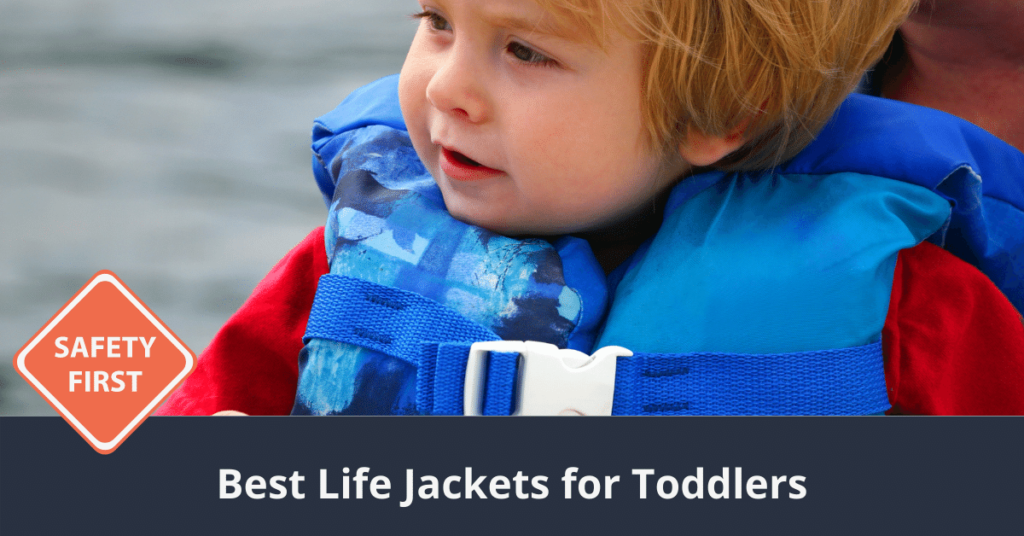

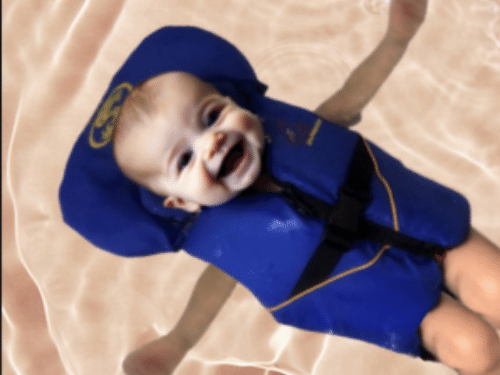
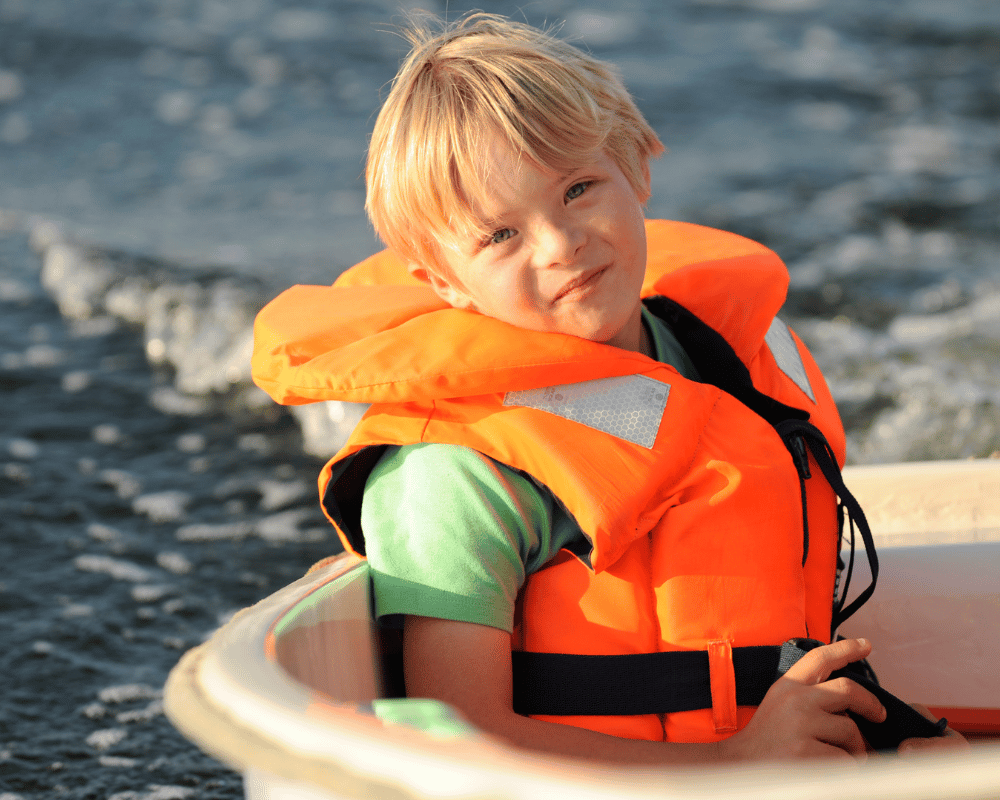

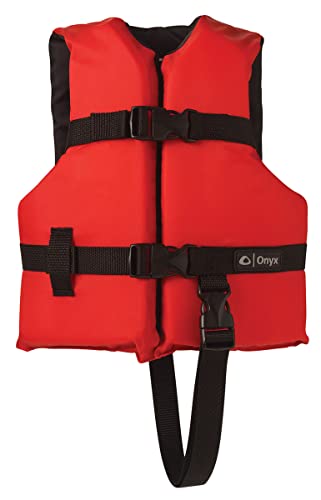
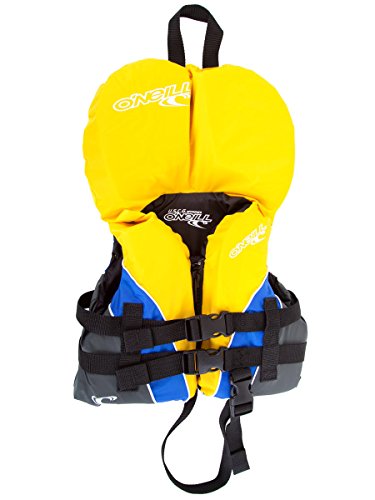


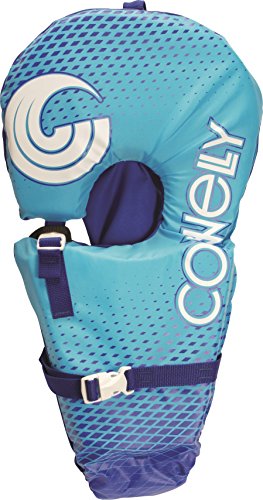

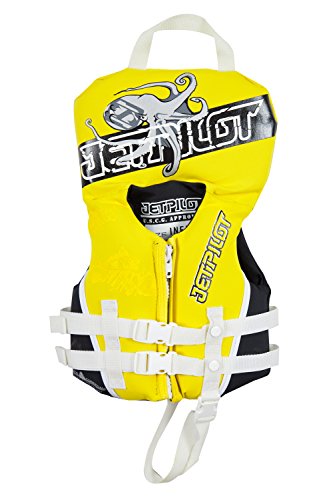
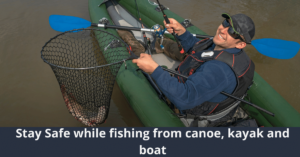
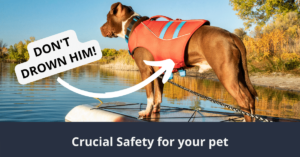
![7 Best Jet Ski Life Jackets with awesome fit [2023 guide] 16 Best Jet Ski Life Jacket](https://insmoothwaters.com/wp-content/uploads/2022/09/Best-Jet-Ski-Life-Jacket-300x157.png)
